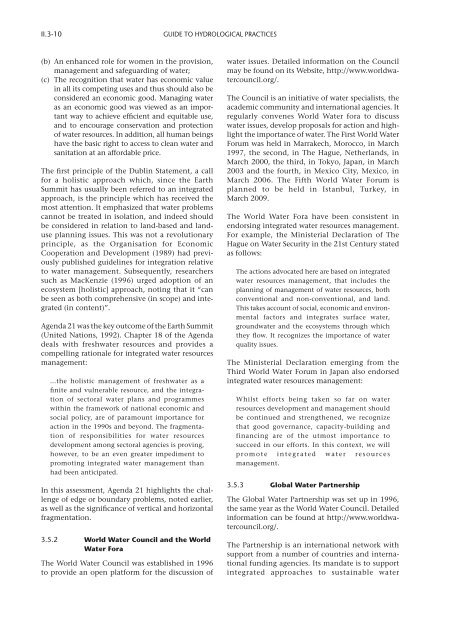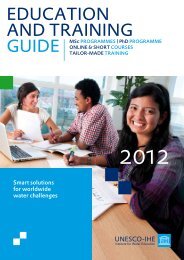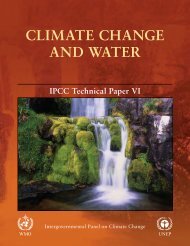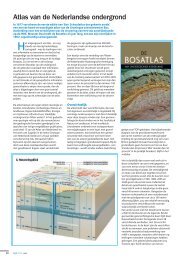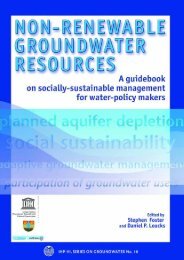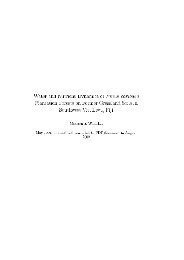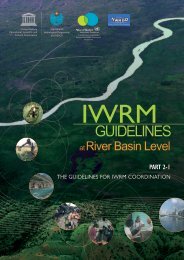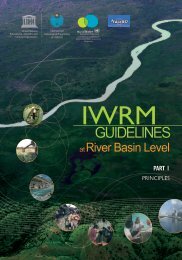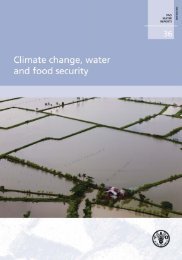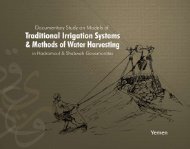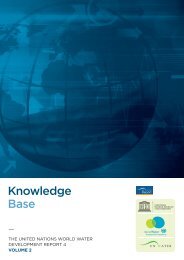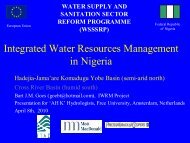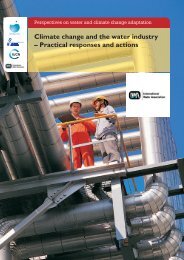Guide to Hydrological Practices, 6th edition, Volume II - Hydrology.nl
Guide to Hydrological Practices, 6th edition, Volume II - Hydrology.nl
Guide to Hydrological Practices, 6th edition, Volume II - Hydrology.nl
You also want an ePaper? Increase the reach of your titles
YUMPU automatically turns print PDFs into web optimized ePapers that Google loves.
<strong>II</strong>.3-10GUIDE TO HYDROLOGICAL PRACTICES(b) An enhanced role for women in the provision,management and safeguarding of water;(c) The recognition that water has economic valuein all its competing uses and thus should also beconsidered an economic good. Managing wateras an economic good was viewed as an importantway <strong>to</strong> achieve efficient and equitable use,and <strong>to</strong> encourage conservation and protectionof water resources. In addition, all human beingshave the basic right <strong>to</strong> access <strong>to</strong> clean water andsanitation at an affordable price.The first principle of the Dublin Statement, a callfor a holistic approach which, since the EarthSummit has usually been referred <strong>to</strong> an integratedapproach, is the principle which has received themost attention. It emphasized that water problemscannot be treated in isolation, and indeed shouldbe considered in relation <strong>to</strong> land-based and landuseplanning issues. This was not a revolutionaryprinciple, as the Organisation for EconomicCooperation and Development (1989) had previouslypublished guidelines for integration relative<strong>to</strong> water management. Subsequently, researcherssuch as MacKenzie (1996) urged adoption of anecosystem [holistic] approach, noting that it “canbe seen as both comprehensive (in scope) and integrated(in content)”.Agenda 21 was the key outcome of the Earth Summit(United Nations, 1992). Chapter 18 of the Agendadeals with freshwater resources and provides acompelling rationale for integrated water resourcesmanagement:...the holistic management of freshwater as afinite and vulnerable resource, and the integrationof sec<strong>to</strong>ral water plans and programmeswithin the framework of national economic andsocial policy, are of paramount importance foraction in the 1990s and beyond. The fragmentationof responsibilities for water resourcesdevelopment among sec<strong>to</strong>ral agencies is proving,however, <strong>to</strong> be an even greater impediment <strong>to</strong>promoting integrated water management thanhad been anticipated.In this assessment, Agenda 21 highlights the challengeof edge or boundary problems, noted earlier,as well as the significance of vertical and horizontalfragmentation.3.5.2 World Water Council and the WorldWater ForaThe World Water Council was established in 1996<strong>to</strong> provide an open platform for the discussion ofwater issues. Detailed information on the Councilmay be found on its Website, http://www.worldwatercouncil.org/.The Council is an initiative of water specialists, theacademic community and international agencies. Itregularly convenes World Water fora <strong>to</strong> discusswater issues, develop proposals for action and highlightthe importance of water. The First World WaterForum was held in Marrakech, Morocco, in March1997, the second, in The Hague, Netherlands, inMarch 2000, the third, in Tokyo, Japan, in March2003 and the fourth, in Mexico City, Mexico, inMarch 2006. The Fifth World Water Forum isplanned <strong>to</strong> be held in Istanbul, Turkey, inMarch 2009.The World Water Fora have been consistent inendorsing integrated water resources management.For example, the Ministerial Declaration of TheHague on Water Security in the 21st Century statedas follows:The actions advocated here are based on integratedwater resources management, that includes theplanning of management of water resources, bothconventional and non-conventional, and land.This takes account of social, economic and environmentalfac<strong>to</strong>rs and integrates surface water,groundwater and the ecosystems through whichthey flow. It recognizes the importance of waterquality issues.The Ministerial Declaration emerging from theThird World Water Forum in Japan also endorsedintegrated water resources management:Whilst efforts being taken so far on waterresources development and management shouldbe continued and strengthened, we recognizethat good governance, capacity-building andfinancing are of the utmost importance <strong>to</strong>succeed in our efforts. In this context, we willpromote integrated water resourcesmanagement.3.5.3 Global Water PartnershipThe Global Water Partnership was set up in 1996,the same year as the World Water Council. Detailedinformation can be found at http://www.worldwatercouncil.org/.The Partnership is an international network withsupport from a number of countries and internationalfunding agencies. Its mandate is <strong>to</strong> supportintegrated approaches <strong>to</strong> sustainable water


